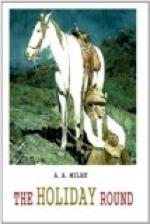He wandered off to the tapioca grove, leant against it in thought for a moment, and came back to me.
“What’s wrong with this little bit of garden—this here park,” he began, “is the soil. It’s no soil for daffodils. Now what daffodils like is clay.”
“Then for Heaven’s sake get them some clay. Spare no expense. Get them anything they fancy.”
“It’s too alloovial—that’s what’s the matter. Too alloovial. Now, crocuses like a bit of alloovial. That’s where you have it.”
The matter with James is that he hasn’t enough work to do. The rest of the staff is so busily employed that it is hardly ever visible. William, for instance, is occupied entirely with what I might call the poultry; it is his duty, in fact, to see that there are always enough ants’ eggs for the goldfish. All these prize Leghorns you hear about are the merest novices compared with William’s protegees. Then John looks after the staggery; Henry works the coloured fountain; and Peter paints the peacocks’ tails. This keeps them all busy, but James is for ever hanging about.
“Almost seems as if they were yooman,” he said, as we stood and listened to the rooks.
“Oh, are you there, James? It’s a beautiful day. Who said that first? I believe you did.”
“Them there rooks always make a place seem so home-like. Rooks and crocuses, I say—and you don’t want anything more.”
“Yes; well, if the rooks want to build in the raspberry canes this year, let them, James. Don’t be inhospitable.”
“Course, some do like to see primroses, I don’t say. But—”
“Primroses—I knew there was something. Where are they?”
“It’s too early for them,” said James hastily. “You won’t get primroses now before April.”
“Don’t say ‘now,’ as if it were my fault. Why didn’t you plant them earlier? I don’t believe you know any of the tricks of your profession, James. You never seem to graft anything or prune anything, and I’m sure you don’t know how to cut a slip. James, why don’t you prune more? Prune now—I should like to watch you. Where’s your pruning-hook? You can’t possibly do it with a rake.”
James spends most of his day with a rake—sometimes leaning on it, sometimes working with it. The beds are always beautifully kept. Only the most hardy annual would dare to poke its head up and spoil the smooth appearance of the soil. For those who like circles and rectangles of unrelieved brown, James is undoubtedly the man.
As I stood in the sun I had a brilliant idea.
“James,” I said, “we’ll cut the croquet lawn this afternoon.”
“You can’t play croquet to-day, it’s not warm enough.”
“I don’t pay you to argue, but to obey. At the same time I should like to point out that I never said I was going to play croquet. I said that we, meaning you, would cut the lawn.”
“What’s the good of that?”




